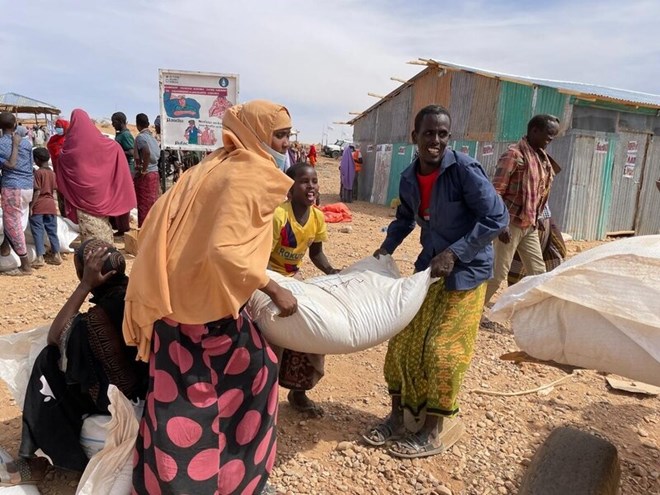
Friday May 6, 2022
A WFP-backed food distribution in Adadle, Ethiopia in January. Photo: WFP/Claire Nevill
The WFP, in its periodic situation update, said the rapidly worsening situation represents about a 39 percent increase from the 58.6 million recorded in November 2021.
advertisements
"The overall food insecurity situation is expected to worsen across most countries in the region through the lean season while faced with multiple and overlapping shocks - drought, flooding, macro-economic challenges and conflict," the WFP said.The WFP said the nutrition situation in the region is critical, with approximately 7 million children under 5 years expected to be acutely malnourished in Ethiopia, Kenya and Somalia, including more than 1.7 million with severe acute malnutrition.
It warned of a high likelihood of a deteriorating nutrition situation in the next three months, exacerbated by the high un-affordability of nutritious diets and drought impacts.
Worsening drought conditions in southern Ethiopia, eastern and northern Kenya, and southern and central Somalia led to severe water and pasture shortages.
In Somalia, there is an increasing risk of famine in the next two months should the seasonal rains fail completely, and humanitarian food assistance not reach those most in need on time, the WFP warned.
It indicated that a fourth consecutive below-average rainfall season is highly likely during the March to May rainy season.
According to WFP, flooding in South Sudan, which has left large swaths of land inundated for three years in a row continues to limit farming and livestock production, affecting many in the Sudd area, particularly in Jonglei, Unity and Upper Nile.
It further said conflict continues to increase the severity of food insecurity, particularly in northern Ethiopia, parts of South Sudan, Sudan, and Somalia.
According to the WFP, severe food insecurity persists in Ethiopia's northern regions of Tigray, Afar, and Amhara despite a recent ceasefire.
In Sudan, South Sudan, and Somalia, politically instigated sub-national conflict over resources as well as inter-communal violence continue, causing population displacement, disrupting livelihoods, markets, and constraining humanitarian access.
The WFP further emphasized that the COVID-19 pandemic has aggravated the pre-existing economic vulnerabilities, which have now been worsened by the global fallout of the Ukraine crisis.
It said the risk of skyrocketing domestic food inflation remains high in six out of the ten East African countries, four of which are already experiencing double-digit food inflation - 13 percent in Somalia, 16 percent in Burundi, 42 percent in Ethiopia and 258 percent in Sudan.